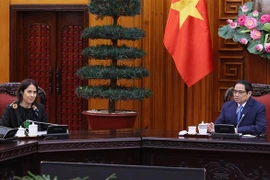The IPEF is designed to serve the Indo-PacificStrategy, which was announced by the US on February 2 this year towards fivemain goals – freedom and openness, connectivity, prosperity, security andresilience.
At the talks, Dien said the initiativecovers many new and non-traditional issues that Vietnam is interested in, suchas supply chain development, and investment in infrastructure and theenvironment. However, because its content isquite diverse with many new issues, the framework needs to be flexible in terms of how toparticipate and the level of participation; and to be adjusted in accordancewith the institutions and interests of each participating country, the minister said.
According to the US plan, theframework is expected to be announced at the end of March at an event hosted byPresident Joe Biden, with the presence of high-ranking officials from other nations.
Dien said that from Vietnam’s pointof view, countries should have enough time to study the IPEF's content, therebymaking a decision to join or not. It is also necessary for the IPEF to have asdiverse as possible participation of countries in the region, especially ASEAN memberstates, he added.
The official proposed that NewZealand and other nations offer technical assistance to Vietnamparticularly concerning the framework’s new fields.
He hoped Vietnam and New Zealand would work closely together to build stances and express them to the US andother countries, especially in areas of common interest such as agriculture.
Minister O’Connoragreed with Dien on such cooperation.
Both sides believed that thedevelopment of this cooperation framework requires consultations at a higherlevel.
In February this year, the US sentto Vietnam a draft document of the IPEF, which mentions four pillars that the USwants to work towards in the framework with other countries. The pillars are fairand resilient trade; supply chain resilience; infrastructure, clean energy anddecarbonisation; and taxation and anti-corruption./.





























